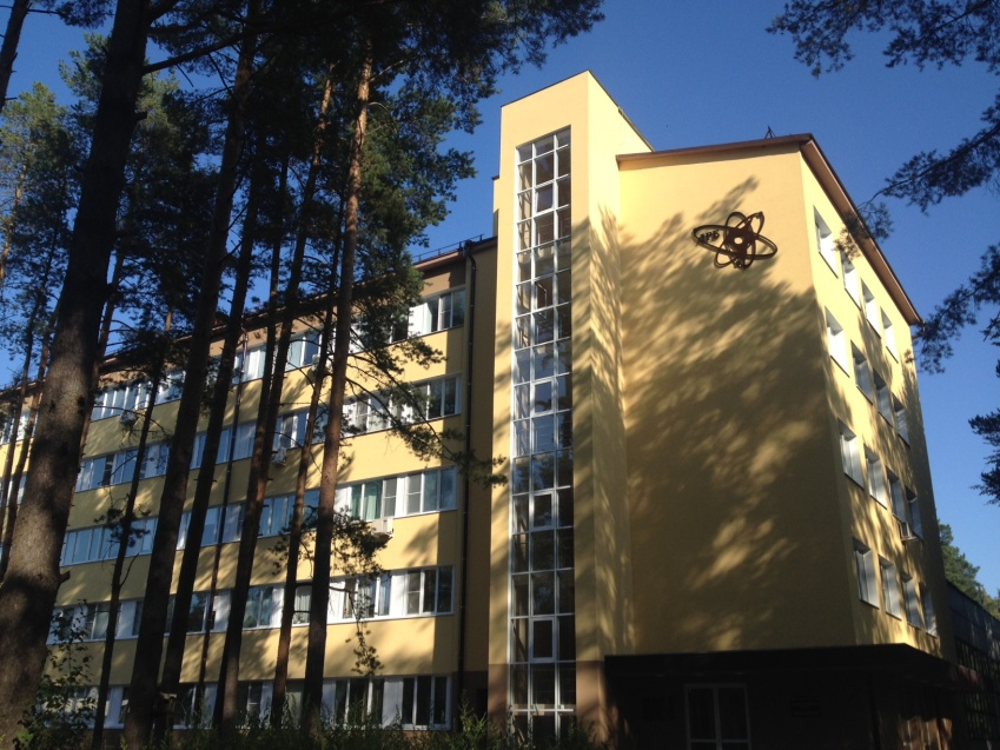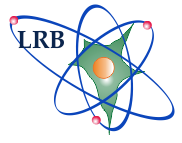 |
|
 |

Laboratory news
First Prize of JINR
12.03.2020
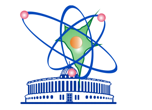
Dear colleagues,
The authors of a series of works entitled "e;Research on molecular damage formation in genetic structures of human and mammalian cells after exposure to low and intermediate-energy accelerated heavy ions"e; – A.V.áBoreyko, T.S.áBulanova, E.A.áKrasavin, E.A.áKruglyakova, E.V.áSmirnova, G.N.áTimoshenko, and M.G.áZadneprianetc – have been awarded JINR's First Prize for scientific, technological, and applied research.
The studies focused on the patterns and mechanisms of DNA damage formation in human and mammalian cells after exposure to ionizing radiation of different quality: accelerated heavy ions and protons and γ-rays. The relevance of the research is determined by the necessity to resolve a number of fundamental issues of radiation medicine, space radiobiology, cytology, and genetics. The work was performed at charged particle beams generated by JINR's accelerators with the use of highly efficient methods of analyzing damage to cell genetic structures: immunocyto- and histochemistry and SMLM (single molecule localization microscopy) – high-resolution nanoscopy.
Web link: http://www.jinr.ru/posts/jinr-prizes-for-2019/
|
International Conference "RADIOBIOLOGICAL BASIS OF RADIATION THERAPY"
17.09.2019

Dear colleagues,
We invite you to take part in the International Conference "Radiobiological Basis of
Radiation Therapy," which will be held on 17-18 October 2019 in Dubna at the Joint Institute
for Nuclear Research (JINR).
The working language of the Conference is Russian.
Organizers
the Department of Physiological Sciences of the Russian Academy of Sciences (RAS);
the National Radiological Medical Research Center of the Russian Ministry of Health;
JINR's Laboratory of Radiation Biology (LRB);
the RAS Scientific Council on Radiobiology. The conference is intended as a forum for the discussion of experimental and clinical
research on radiation therapy and diagnosing malignant neoplasms; modern perspectives on the
methods and dosage schedule of the diagnosing and treatment of different diseases using
ionizing radiation; and latest achievements in molecular radiobiology and radiology in this field.
Topics
- Molecular and cellular mechanisms behind the radiosensitivity of normal and tumor cells
and tissues. Modern approaches to the control of radiosensitivity based on new
fundamental knowledge.
- Long-term consequences of radiotherapy; post-radiation complications; second tumor
risk.
- Prediction of radiation therapy efficiency: achievements and prospects. Design of new
biomarkers of the individual radiosensitivity of malignant neoplasms based on omics
technologies, including genomics, transcriptomics, proteomics, etc.
- New approaches to the individual planning of radiation and combined therapy as part of
the development of personalized medicine.
- Biological basis and clinical effects of new radiation therapy methods (hadron, binary,
tissue, photodynamic, etc.). Optimization of radiation therapy modes.
- Development and application of radiomodifiers in the radiation therapy of tumors.
- Radiopharmaceuticals in diagnosing and therapy.
- Training specialists in radiobiology, radiation therapy, and medical physics in Russia and
Europe.
Program
Organizing Committee Co-Chairs
A.D. Kaprin, Acad. RAS; Director, National Radiological Medical Research Center of
the Russian Ministry of Health
E.A. Krasavin, RAS Corresp. Member; Director, JINR LRB; Chair, RAS Scientific
Council on Radiobiology
First circular (in Russian)
How to get to Dubna
From Moscow by train
The Savelovsky Railway Station (the Savelovskaya metro station). The Organizing Committee recommends the Moscow - Dubna express train.
The schedule
From Moscow by bus
The Timiryazevskaya metro station.The schedule
Venue
JINR's International Conference Hall, 2 Stroiteley st., Dubna
A clickable sketch map
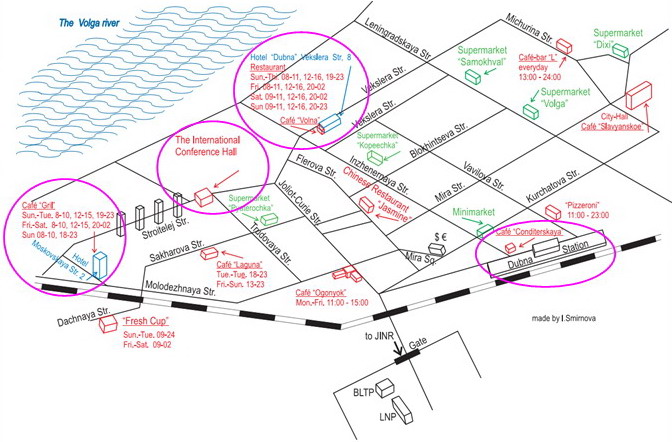
|
International Conference "CURRENT PROBLEMS IN RADIATION GENETICS"
31.05.2019

Dear colleagues,
You are welcome to participate in the International ConferenceáCurrent Problems in Radiation Genetics,áwhich will take place oná27-28 June 2019 at the Joint Institute for Nuclear Research (JINR) in Dubna, the Moscow Region, Russia.
The working language of the Conference is Russian.
Organizers
The Scientific Council on Radiobiology of the Russian Academy of Sciences (RAS)
The RAS Radiobiological Society
JINR's Laboratory of Radiation Biology (LRB) The conference program will include the discussion of modern experimental data on the mechanisms of the formation of genetic and epigenetic changes in organisms exposed to different doses of different ionizing radiations and consequences of these changes.
Topics
- Induction of molecular and genetic damage by ionizing radiations with different physical characteristics
- Genetic and epigenetic changes caused by ionizing radiation exposure
- Gene expression after exposure to low and high doses of ionizing radiation
- Ionizing radiation exposure action on mitochondrial genetics
- Factors and development mechanisms of genome instability
Program (in Russian)
Organizing Committee
Chairs
E.A. Krasavin, RAS Corresp. Member; Director, LRB JINR
A.V. Rubanovich, Dr. Biol., Vavilov Institute of General Genetics RAS
Members
A.V. Boreyko, Dr. Biol., LRB JINR
A.I. Gaziev, Dr. Biol., Prof., Institute of Theoretical and Experimental Biophysics RAS; President, RAS Radiobiological Society
S.A. Geraskin, Dr. Biol., Prof., Russian National Institute of Radiology and Agroecology
I.A. Zamulaeva, Dr. Biol., Prof., Tsyb National Medical Radiology Research Center of Russia's Ministry of Health
I.V. Koshlan, Cand. Biol., LRB JINR
A.A. Moskalev, RAS Corresp. Member; Komi Center, Ural Branch RAS
V.Yu. Nugis, Dr. Biol., Burnazian Federal Medical and Biophysical Center (FMBC) of Russia's Federal Biomedical Agency
A.N. Osipov, Dr. Biol., FMBC
V.I. Naidich, Executive Secretary, Cand. Chem.; Scientific Secretary, RAS Scientific Council on Radiobiology
First circular (in Russian)
How to get to Dubna
From Moscow by train
The Savelovsky Railway Station (the Savelovskaya metro station). The Organizing Committee recommends the Moscow - Dubna express train.
The schedule
From Moscow by bus
The Savelovsky Railway Station (the Savelovskaya metro station). Walk towards Butyrskaya Street; the bus stop is across the street from the O'Stin shop. The schedule
Venue
JINR's International Conference Hall, 2 Stroiteley st., Dubna
A clickable sketch map

|
JINR Distinguished Postdoctoral Research Fellowship Programme
01.05.2019

|
The Joint Institute for Nuclear Research is seeking for outstanding postdoctoral fellows and announces a call for applications for a number of vacant scientific research positions. New research positions are opened within the special program aiming at reinforcement of the scientific personnel involved in realization of the JINR top-priority projects in the fields of theoretical and experimental physics of elementary particles, relativistic heavy ion-, nuclear- and condensed matter physics, radiobiology.
Read more...
Job Requirements:  |
International Conference "Problems of Radiation Exposure-Related Chemical Protection and Repair"
07.05.2018

|
Dear colleagues,
We invite you to take part in the International Conference "Problems of Radiation Exposure-Related Chemical Protection and Repair", which will be held on 30-31 May 2018 at the Joint Institute for Nuclear Research in Dubna.
The conference organizers are
- the Scientific Council on Radiobiology of the Russian Academy of Sciences;
- JINR's Laboratory of Radiation Biology;
- Farmzashchita (Pharmacological Protection), a research and production center of the Federal Biomedical Agency of Russia;
- OOO Spetsialnaya i meditsinskaya tekhnika (Spetsmedtekhnika) (Special and Medical Equipment, a limited liability company under the laws of the Russian Federation).
The conference is intended for specialists studying radiation's damaging action mechanisms; radiation damage repair; and development, testing, and practical application of radioprotective preparations.
The conference's main topics will be the following:
- New approaches to the search for, classification, and design of new radioprotective preparations.
- Modern concepts of radiation-induced damage repair mechanisms and possibilities of their modification.
- Criteria of the evaluation of the radiomodifying effect of radioprotective preparations; prospects for their experimental and clinical application. Identification of medicine-induced radioresistance markers.
- Pharmacochemical protection against densely ionizing radiations. Chemical protection problems of space flights.
- Prospects for the development and introduction of radiosensitizers, radioprotectors, and preparations for the prophylaxis and treatment of the side effects of radiation and radiochemotherapy.
- Ways of improving the medicamentous treatment of clinical radiation damage. Modern capabilities of the prophylaxis and therapy of the main syndromes of radiation damage, including local, combined, and associated; and damage induced by radionuclide incorporation.
- Problems of conducting pre-clinical and clinical research; radioprotector production, introduction, and stock formation.
Organizing Committee
Chairman: Prof. E.A. Krasavin, Dr. Biol., Corresponding Member of the Russian Academy of Sciences (RAS), Director of JINR's Laboratory of Radiation Biology, Head of the RAS Scientific Council on Radiobiology
Deputy chairs
Prof. A.N. Grebeniuk, Dr. Med., Deputy Director for Research of OOO Spetsmedtekhnika (Special and Medical Equipment, a limited liability company under the laws of the Russian Federation)
Prof. L.M. Rozhdestvensky, Dr. Biol., Head of Laboratory, Burnazian Federal Biomedical Center of the Federal Biomedical Agency (FMBA) of Russia
Members
Prof. A.Yu. Bushmanov, Dr. Med., 1st Deputy Director General of FMBA's Burnazian Federal Biomedical Center
Prof. A.I. Gaziev, Dr. Biol., RAS Institute of Theoretical and Experimental Biophysics, President of the RAS Radiobiological Society
Prof. V.D. Gladkikh, Dr. Med., Deputy Director for Research of FMBA's Farmzashchita (Pharmacological Protection), a research and production center
I.S. Drachev, Dr. Med., Department Head, Research and Testing Institute of Military Medicine of the Russian Federation's Ministry of Defense
Prof. A.A. Ivanov, Dr. Med., Head of Laboratory, RAS Institute of Biomedical Problems
I.V. Koshlan, Cand. Biol., Head of Sector, Scientific Secretary of JINR's Laboratory of Radiation Biology
Prof. V.I. Legeza, Dr. Med., Leading Researcher, the Radiation Department of the Military Medical Academy of the Russian Federation's Ministry of Defense
Prof. I.K. Romanovich, Dr. Med., RAS Corresponding Member, Director of St. Petersburg Institute of Radiation Hygiene of Rospotrebnadzor (the Federal Service for Supervision of Consumer Rights Protection and Human Well-Being)
Prof. A.S. Simbirtsev, Dr. Med., RAS Corresponding Member, Scientific Supervisor of FMBA's Institute of Ultraclean Biopreparations
M.V. Filimonova, Dr. Biol., Head of Laboratory, Tsyb National Medical Radiology Research Center (a branch of the National Medical Radiology Research Center of Russia's Ministry of Health)
Prof. I.B. Ushakov, Dr. Med., Acad. RAS, Chief Researcher, FMBA's Burnazian Federal Biomedical Center
Executive Secretary: V.I. Naydich, Cand. Chem., Scientific Secretary of the RAS Scientific Council on Radiobiology
Phones:
+7-496-216-25-77 Igor Koshlan
+7-495-939-74-38 Valeria Naydich
E-mail: koshlan@yandex.ru
How to arrive from Moscow:
By train:
The Savelovsky railway terminal (the metro station Savelovskaya). The Organizing Committee recommends to take the Moscow - Dubna express. Please check the schedule here.
By bus:
The Savelovsky railway terminal (the metro station Savelovskaya). Go towards Butyrskaya St.; the bus stop is in front of the O'STIN shop. Please check the schedule here.
The conference venue:
JINR's International Conference Hall, 2 Stroiteley St., Dubna.
Map:

|
International Conference "Modern Trends in General and Space Radiobiology."
15.09.2017

|
Dear colleagues!
We invite you to take part in the International Conference "Modern Trends in General and Space Radiobiology." The conference will be held on 12-13 October 2017 in Dubna at the International Conference Hall (2 Stroiteley Str.).
The conference is organized by
JINR's Laboratory of Radiation Biology (LRB)
Scientific Council on Radiobiology of the Russian Academy of Sciences (RAS)
RAS Radiobiological Society
The main fields of modern radiation and space biology research include regularities and mechanisms
of molecular disorders in the genetic structures of mammalian and human cells; mutation formation; neuroregulatory effects; molecular and cytogenetic disorders in different organism's tissues; radiation damage to the central nervous system (CNS), and, as a consequence, cognitive function disorders induced by ionizing radiations of different quality. The radiation effects on the CNS is an increasingly urgent topic from the perspective of the future deep space flights. At the conference, modern data will be presented on the mechanisms of the development of the cellular, molecular, and genetic changes in mammalian and human cells under exposure to radiations with different physical characteristics as well as consequences of these changes. Results will be considered of research on the response of different CNS structures to radiation exposure determining the specifics of the cognitive and behavioral functions in laboratory animals.
The main topics of the conference will be as follows:
1. Formation of molecular-genetic, molecular, and cellular damage under exposure to ionizing radiations with different physical characteristics.
2. Induction and repair of genetic damage in highly differentiated elements of the nervous system.
3. Response of highly differentiated cell systems (the retina and CNS structures) to radiation exposure.
4. Animals' cognitive functions and their neurochemical and neurophysiological correlates under exposure to radiation and other physical factors.
Organizing Committee
Chairman: E.A. Krasavin, RAS Corresponding Member, JINR's LRB Director
Co-Chairman: M.A. Ostrovsky, RAS Academician, Institute of Chemical Physics RAS
Executive Secretary: V.I. Naydich, Cand. Chem., Scientific Secretary of the RAS Scientific Council on Radiobiology
A.I. Gaziev, Dr. Biol., Institute of Theoretical and Experimental Biophysics
I.V. Koshlan, Cand. Biol., JINR's LRB Scientific Secretary
V.Yu. Nugis, Dr. Biol., Burnazyan Federal Medical Biophysical Center of the Russian Federal Medical Biological Agency
I.I. Pelevina, Dr. Biol., Institute of Chemical Physics RAS
A.V. Rubanovich, Dr. Biol., Institute of General Genetics RAS
A.S. Stemberg, Dr. Biol., Institute of Biomedical Problems RAS
I.A. Zamulaeva, Dr. Biol., Laboratory Head, Medical Radiological Research Center of the Russian Ministry of Health
Contact phones:
Igor Koshlan: +7 496 216 25 77
Valeria Naydich: +7 495 939 7438
Announcement
|
The Fifth Anniversary of the Successful Operation of the DAN
07 September 2017

|
On 7 September 2017, a seminar was held at the Institute of Space Research of the Russian Academy of Sciences (RAS) to mark the fifth anniversary of the successful operation of the DAN (Dynamic Albedo of Neutrons) instrument on board NASA's Curiosity Mars rover. DAN is designed to search for water in Martian soil along the rover's path. Specialists of JINR's Laboratory of Neutron Physics (LNP) and Laboratory of Radiation Biology (LRB) actively participated in DAN development, fabrication, and calibration. A special experimental stand with a Martian soil model was constructed at JINR to operate DAN and other nuclear planetary science instruments.
LRB Deputy Director G.N. Timoshenko, LRB researcher A.R. Krylov, and LNP Director V.N. Shvetsov were awarded RAS honorary certificates for their contribution to the creation of DAN.
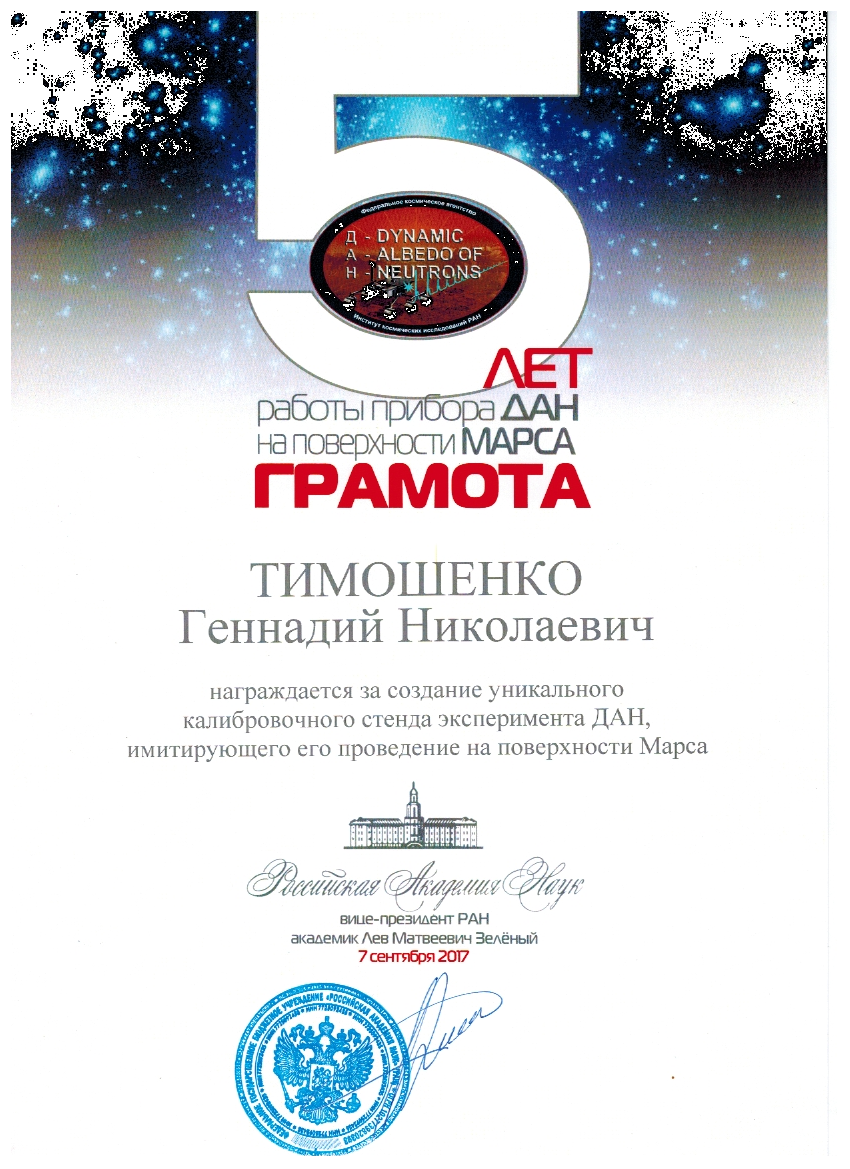
In more detail, the stand is presented in a 360° TV channel's report (in Russian, beginning with 3:55)
|
The Research Conducted at the Astrobiology Sector of LRB JINR
08 August 2017

|
Astrobiology is an actively developing field of modern science. This research allows a closer approach to the problem of the origin of life on Earth and the issue of the habitability of other planets or their moons. Astrobiology is in the center of quite a number of space research projects.
LRB's Astrobiology Sector conducts research in the following areas:
- Studying biofossils and organic compounds in meteorites and ancient terrestrial rocks.
- Studying the synthesis of complex prebiotic compounds from formamide under radiation exposure in the presence of meteorite matter as a catalyst.
- Biogeochemical studies of cosmic dust.
- Studying space matter with nuclear physics methods.
In spring 2017, a Tescan Vega 3 scanning electron microscope was put in operation to search for microorganism fossils in meteorites (carbonaceous chondrites). The first results confirmed the presence of microorganisms, including eukaryotes (diatoms) in samples of several meteorites. An analysis was performed which gives grounds to suggest that those are not a modern biocontamination.
360° TV channel's report on the research conducted at the Astrobiology Sector of LRB JINR (beginning with 3:00)
|
Round-Table Meeting "Topical Issues of General and Space Radiobiology and Astrobiology"
08 September 2014

|
On 28-29 October 2014, The Round-Table Meeting "Topical Issues of General and Space Radiobiology and Astrobiology" in Memory of Academicians N.M. Sissakian and A.N. Sissakian will be held.
Organizers: Laboratory of Radiation Biology (JINR), Scientific Council on Astrobiology with the RAS Presidium, RAS Scientific Council on Radiobiology, RAS Scientific Council on the Problems of Paleobiology and Organic World Evolution, Institute of Biomedical Problems RAS, Borisiak Paleontology Institute RAS, and Dubna University.
Experiments on modeling the biological action of space radiation have been performed at JINR's accelerators for more than 50 years. JINR's first accelerator, Synchrocyclotron, played an outstanding role in providing radiation safety for the first manned space flights. JINR's unique park of accelerators allows conducting complex research at the molecular, cytogenetic, and organismal levels of biological organization. The ion energies available at these accelerators overlap a significant part of the energy range of the galactic cosmic ray nuclei.
The topics of the meeting include:
- Radiation-induced cytogenetic effects. Regularities in DNA damage induction and repair.
- Radiation and radiobiological aspects of long-term manned space flights. Problems of providing radiation safety for long-term manned space flights.
- Action of high-energy heavy charged particles on the structures and functions of the central nervous system.
- Modeling the action of heavy charged space particles on biological objects.
- Biogeochemical studies of space dust.
- Studies of biofossils in meteorites and ancient terrestrial rocks.
- Space matter research with nuclear physics methods.
Web site: http://lrb.jinr.ru
Contacts: Scientific Secretary: Dr. Igor Koshlan, E-mail: koshlan@jinr.ru, Phone: +7 (49621) 62577, 62847, Fax: +7 (49621) 65948
Postal address: Laboratory of Radiation Biology, Joint Institute for Nuclear Research, 6 Joilot-Curie St., 141980 Dubna, Moscow Region, Russia
Download Information Letter
Round Table programme (rus)
|
The highest decoration of the Mongolian Academy of Sciences
16 October 2013

|
On 4 October, the Mongolian Academy of Sciences (MAS) held a ceremony of awarding the Director of the Laboratory of Radiation Biology Prof. E.A. Krasavin, a Corresponding Member of the Russian Academy of Sciences, the Academy's highest decoration: the Kublai Khan Gold Medal. The award was given for his significant contribution to the development of fruitful cooperation between MAS, higher education institutions of Mongolia, and JINR. The medal was awarded by the President of the Mongolian Academy of Sciences Acad. B. Enkhtuvshin. MAS Vice-Presidents Acads. D. Regdel and T. Dorzh, MAS Chief Scientific Secretary Acad. T. Galbaatar, the Director of the MAS Institute of Paleontology Acad. R. Barsbold, and the Director of the Center of Nuclear Research of the National University of Mongolia, Mongolia's Plenipotentiary at JINR Prof. S. Davaa cordially congratulated Prof. E.A. Krasavin on the award and expressed a hope for further development and strengthening of the scientific ties between Mongolia and JINR.
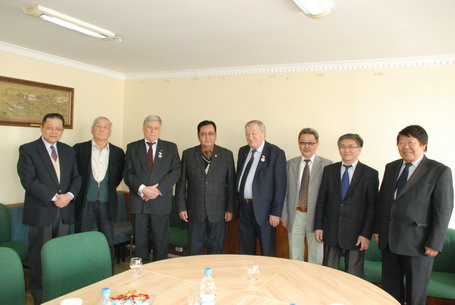
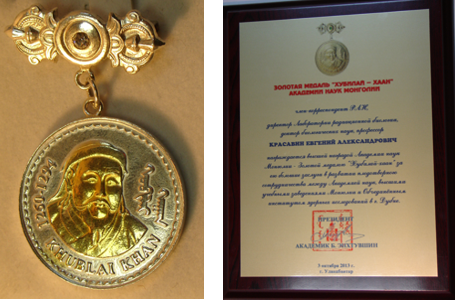
|
"Molecular Simulation Studies in Material and Biological Sciences"
03 September 2012
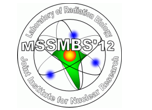
|
The 5th Japan-Russia International Workshop MSSMBS 2012 źMolecular Simulation Studies in Material and Biological Sciences╗ will be held on 10 September 2012 in the International Conference Hall in Dubna and on 11 September 2012 in the RAS Institute of Bioorganic Chemistry in Moscow.
MSSMBS-2012 site |
Field Session of the Bureau of the Department of Physiology and Fundamental Medicine, the Russian Academy of Sciences
29 June 2012

|
On 27ľ28 June 2012, a Session of the Bureau of the Department of Physiology and Fundamental Medicine (DPFM) of the Russian Academy of Sciences (RAS) was held in Dubna. Besides the DPFM, the Session organizers included the Institute of Higher Nervous Activity and Neurophysiology RAS, the Institute of Medical and Biological Problems RAS, and JINR.
The Session was presided by RAS Academicians V.A. Matveev (JINR Director), A.I. Grigoryev (RAS Vice-President), and Yu.V. Natochin (Secretary Academician of the DPFM RAS).
Radiobiological research has been conducted at JINR's charged particle accelerators for more than 50 years. On the initiative of, and with support from, Academicians A.V. Lebedinsky, V.V. Parin, and O.G. Gazenko, large-scale experiments were started at JINR to determine the biological effectiveness of high-energy protons. This work made it possible to provide radiation protection measures for the first space crews.
An important event in strengthening the ties between JINR and RAS was the RAS Department of Biological Sciences (DBS) passing a resolution in 2008 that the DBS be in scientific and methodological charge of the Laboratory of Radiation Biology (LRB), JINR. Now it is the DPFM RAS that directs the LRB as regards scientific research and methodology.
The Session focused on the following issues:
- the effect of high-energy heavy charged particles on the structures and functions of the central nervous system;
- regularities and mechanisms of radiation cataractogenesis and visual reception disorders;
- prediction of the danger of galactic heavy nuclei for manned interplanetary flights.
Among the Session participants were six RAS Acting Members, eight RAS Corresponding Members, and leading physicists, biologists, physiologists, and medics of Russia's major research centers, which indicates a high level of the discussions.
On the first day of the Session, LRB Director Prof. E.A. Krasavin, a RAS Corresponding Member, gave a talk entitled "Radiobiological Research at JINR's Accelerators: Results and Prospects." The Session participants were also presented reports on the opportunities for carrying out fundamental and applied research at JINR's basic facilities: the accelerator complex of the Laboratory of High Energy Physics and the upgraded IBR-2 reactor at the Laboratory of Neutron Physics.
Session program (in Russian)
Resolutions of the Bureau of the Department of Physiology and Fundamental Medicine of the Russian Academy of Sciences (in Russian)
Mass media about the Session: the journal "Nauka i tekhnologii" ("Science and Technologies," in Russian), No. 15(17) of 31 July 2012 (pdf, 8.5 Mb) (in Russian)
Poster
Photos
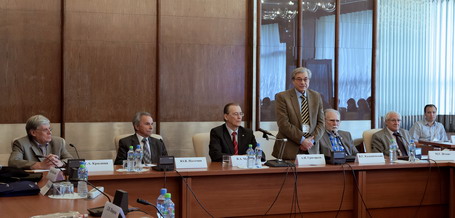
|
Jubilee
20 April 2012

|

The LRB staff cordially congratulate the Laboratory's Director Evgeny Krasavin on his 70th jubilee!
|
Medal of Honor
30 December 2011
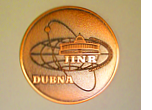
|
At a session of the JINR Directorate, 29 December 2011, the LRB Director Corresp. Acad. E.A. Krasavin was ceremonially awarded the Memorial Medal of Honor "For Outstanding Services to Science and the Joint Institute for Nuclear Research." The medal was presented with the following wording: "For highly valuable scientific results, significant contribution to the development of radiation biology, and fruitful educational and scientific activity for the benefit of science in Russia and JINR." The LRB staff subscribe to the congratulations to the Laboratory's Director.
|
Elections to the Russian Academy of Sciences
25 December 2011
The Round Table ItalyľRussia @ Dubna finished its work
18 December 2011

|
The Italian ľ Russian Round Table "Astrobiology: New Ideas and Research Trends" organized by the Embassy of the Italian Republic in the Russian Federation in cooperation with the Joint Institute for Nuclear Research and the Scientific Council on Astrobiology of the Russian Academy of Sciences was closed on 13 December 2011.
The subject area of the Round Table included a wide range of issues connected with the origin of life, evolution on the Earth and in the conditions of space, and the existence of life in the extreme conditions on the Earth and in space. A number of talks by Russian and Italian scientists were concerned with studying space dust and the search for organic molecules in space. Much attention was paid to problems of the search for exoplanets, carrying out long-term manned space missions beyond the Earth's magnetosphere, and application of nuclear physics methods for the analysis of terrestrial and extraterrestrial planets. A notable aspect of the Round Table was that it was participated by prominent scientists representing biology, paleontology, biochemistry, astronomy, astrophysics, geology, and more.
The main results of the event are the establishment of new ties between scientists who work in different areas connected with astrobiology. A number of important agreements on cooperation between Italian and JINR scientists were achieved during the Round Table. The participants of this conference noted its high level and proposed that similar meetings with the participation of Italian and Russian scientists be held regularly. This Round Table which took place at Dubna can be regarded as one of bright events that conclude the year of the Russian culture in Italy and the Italian culture in Russia.
Round Table site Photo
"Russia 24: Cosmonautics" TV report, December 17, 2011
|
Round Table ItaliaľRussia @ Dubna "Astrobiology: New Ideas and Research Trends"
26 October 2011
|
|
Postal address:
LRB, JINR, Joliot-Curie 6,
141980 Dubna, Moscow region, Russia
Phone: +7 (49621) 62688
Telefax: +7 (49621) 65948

Copyright © LRB, JINR
|
|
 |

